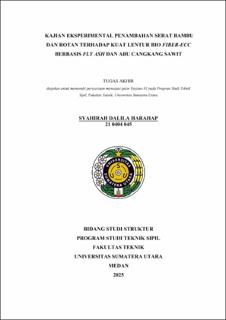| dc.description.abstract | Engineered Cementitious Composite (ECC) is an innovative composite material composed of cement, sand, water, additives, and supplementary cementitious materials, without the inclusion of coarse aggregates (gravel). One of the key advantages of ECC lies in its ability to resist flexural loads and control micro-cracking through the incorporation of fibers into the mix. This study investigates the effect of incorporating natural bamboo and rattan fibers—locally sourced and environmentally friendly bio fibers—on the flexural performance of ECC mortar. The research explores variations in fiber content (1%, 1.5%, and 2%) and fiber length (0.5 cm and 1 cm). The results indicate that the addition of natural fibers generally enhances the flexural strength of ECC, with the most optimal performance observed at 1.5% fiber content and 0.5 cm fiber length. Rattan fiber demonstrated the highest mechanical performance, achieving a flexural strength of 6.909 MPa at 3 days and 7.870 MPa at 7 days, representing a 58.4% increase compared to the control sample. Bamboo fiber also showed significant improvement, reaching 6.713 MPa at 3 days and 7.045 MPa at 7 days, with an increase of up to 120.02%. However, at 2% fiber content, a decline in flexural performance was observed, likely due to uneven fiber distribution within the matrix, which may compromise the internal structural integrity. These findings suggest that locally sourced bamboo and rattan fibers, at an optimal content of 1.5% and a length of 0.5 cm, can enhance the mechanical properties of ECC. Moreover, the use of these natural fibers presents a sustainable and eco-friendly alternative for reinforcing cementitious composites, supporting the development of green construction materials. | en_US |


